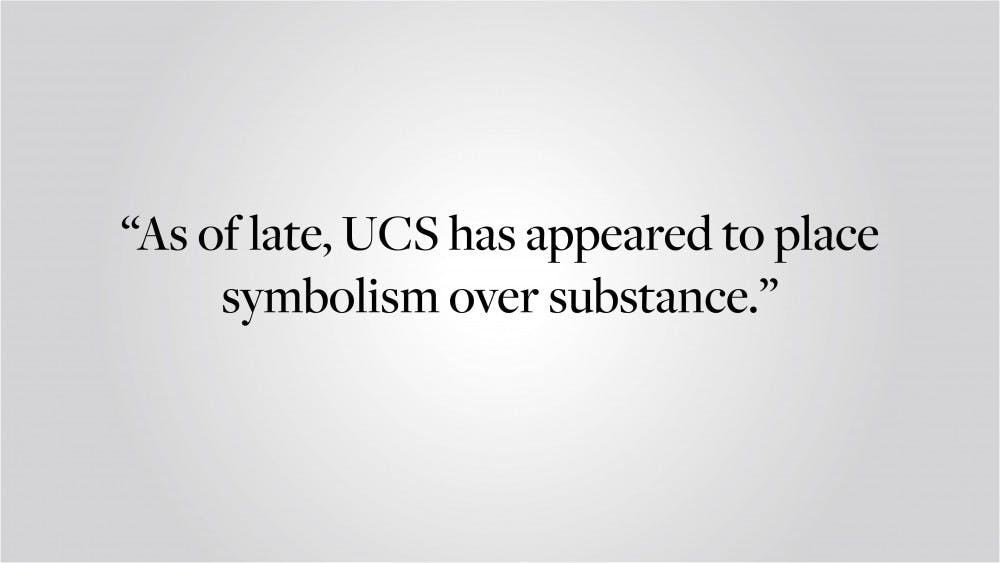It’s that time of year again: The weather’s improving, student government campaigns have begun and the student body, as usual, appears indifferent. This is not a new phenomenon. In 2013, the editorial page board wrote that “a strong culture of apathy undeniably exists” among students with respect to student government. Since then, a lack of competition has frequently plagued contests for top positions on the Undergraduate Council of Students, and student participation rates have remained dismal.
While we cannot speak to the causes of student apathy in past years, in recent years, UCS has ostensibly placed a disproportionate amount of its public focus on the minutiae of rules and optics, rather than actually serving students. We believe actions like this discourage students from engaging with UCS and undermine the Council’s ability to represent the student body.
In recent months, there appears to have been a shift in focus. Multiple candidates for various UCS positions have included calls for internal reform in their platforms. At least one campaign explicitly mentions the long and troublesome bylaws and generally complex nature of UCS as barriers to student engagement. Some current UCS members have also publicly called on the Council to revise its bylaws and to implement “uniform transparency and accountability rules.” And this year, a referendum to inaugurate an ethics and accountability board within UCS is on the ballot. This board would serve as a mechanism for resolving disputes, both external and internal, that hamper the Council’s ability to effectively operate.
We are pleased to see a surge in recognition that the Council’s practices need improvement. If UCS members truly want to help the student body, they should continue pushing for reform of UCS itself rather than working within a broken system. But these structural reforms are not enough — and if they add even more layers to UCS’ bureaucratic quagmire, they could perpetuate the chasm between the student body and its government. At the heart of the issue, UCS is in need of a cultural transformation.
To be clear, we aren’t criticizing UCS members as individuals, who are, by and large, genuinely passionate, capable and well-intentioned. The problem lies in the Council as an institution. As of late, UCS has appeared to place symbolism over substance.
In an attempt to legitimize itself, the Council has embodied the worst parts of government bureaucracy. Between its endless bylaws and convoluted voting procedures, the Council has chosen formality over efficacy. It’s not that UCS hasn’t produced meaningful policy. Initiatives like Project Tampon, the free airport shuttle program and recent campaigns to reduce campus fees are all a testament to this. But we wonder how much more the Council could accomplish if it adopted a system that spent less time on administrative procedure and more on making it easier for students — both inside and outside of UCS — to use it as an avenue for actualizing policy ideas.
The disconnect between UCS and the student body comes, in part, from a failure in communication. UCS needs to do a better job of sharing what it has accomplished, and the student body needs to do a better job of listening. We’ve written on this before. But we also think the Council could benefit from greater self-awareness.
Cumbersome guidelines and processes inherently create barriers to understanding and engagement. To be sure, UCS candidates may work exceedingly hard to advertise their campaigns come election season, and UCS members may make earnest attempts to engage with their respective constituencies throughout the school year. But the Council’s opaque and complex processes have left many students disillusioned. If an average student wanted to use UCS as a vehicle for change, they likely wouldn’t know where or how to begin. Or they may not trust that the Council’s process — burdened by draconian bylaws and voting procedures — would allow their ideas to be actualized. Red tape is best left on Capitol Hill, not College Hill.
UCS’ bureaucratic emphasis on rules and procedures has other failings: It has fueled misplaced priorities, such as the Council’s disproportionate focus on bolstering its own legitimacy. Quarrels over whether the Class Coordinating Board should be viewed as a legitimate branch of student government are a concrete example of this. Defining these boundaries is certainly a worthy task. But the highly public nature of this debate and the undue amount of time and energy attached to it have turned a semantic problem into something that merely exacerbated student indifference and annoyance towards student government. Whether or not CCB is a form of student government is not an issue that most students particularly care about — something that should be of fundamental concern to an assembly that purports to represent the interests of students.
A functional student government is one that fosters engagement. UCS, despite its best intentions, has inadvertently bred student nonparticipation. Through its flurry of overcomplicated language and procedure, the Council continues to distance itself from the important work of advocating for its constituents. But amending this chronic issue must start at the organizational level. An election season is an inflection point to begin thinking about a renewed culture under fresh leadership.
Editorials are written by The Herald’s editorial page board. This editorial was written by its editor and assistant editor, Krista Stapleford ’21 and Johnny Ren ’23, and members Olivia Burdette ’22, Devan Paul ’24 and Kate Waisel ’24.

ADVERTISEMENT




